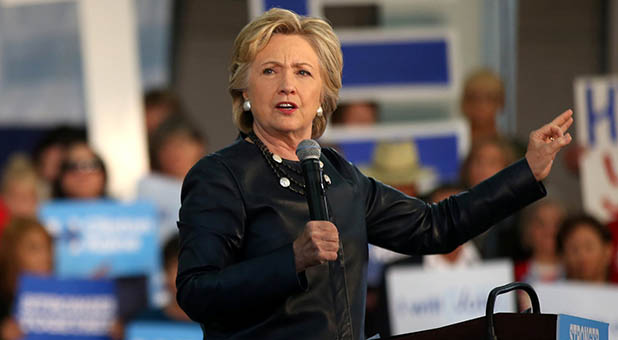WikiLeaks: Hillary Clinton’s Lying About Her Change in Position on TPP
During her Feb. 4 debate with U.S. Sen. Bernie Sanders (I-Vt.), now-Democratic presidential nominee Hillary Clinton said she was “holding out the hope” that the Trans-Pacific Partnership would be “the kind of trade agreement that I was looking for.”
“I waited until it had actually been negotiated because I did want to give the benefit of the doubt to the (Obama) administration,” she said. “Once I saw what the outcome was, I opposed it.”
Most political fact checkers rated that statement, at best, only half-true. But over the weekend, WikiLeaks rated as a pants-burning-on-fire lie.
In an email dated October 2015 and released Sunday by WikiLeaks, Clinton campaign Labor Outreach Director Nikki Budzinski strategized with campaign chairman John Podesta and campaign manager Robby Mook how to “roll out” her opposition to TPP. The goal, it appears, was to win over the support of the American Federal of Labor and Congress of Industrial Organizations, which had made the trade deal its key litmus test in the presidential election.
“First, I’m very glad HRC has gotten to the oppose position, this will be very helpful with mobilization on the ground and support within labor during and after this primary,” she wrote. “The timing question for the roll out came up and I am wanted [sic] you to know I voiced my support for waiting for disclosure of the full document before HRC states her opposition on the issue.”
She then gave three reasons why:
- Waiting until she can say she’s reviewed the language in the agreement is consistent with where her position has been and why she’s waited this long to weigh in. We don’t have the language yet or much documentation to fall back that she will be able to credibly say she reviewed and then therefore weighed in on. If she weighs in now, without viewing the document, some in labor might wonder why she didn’t just say she opposed earlier? (Sander’s polling and so on.) It might make her position appear more political then what they’ll accuse her of anyways.
- It will not make a significant difference in capitalizing politically with labor if we do this tomorrow or three weeks from now, as long as we get to opposition.
- AFLCIO and AFT have both issued statements that they are waiting to see the language before fully weighing in. I think they realize (even though they will oppose) they lose credibility on the issue if they weigh in without seeing the document. If we wait until the document is released, we are consistent with the AFL-CIO and AFT’s current position on the deal.
Budzinski then had some suggestions for how to maximize the political impact of her newly announced opposition to TPP—which she referred to in 2012 as “the gold standard” of trade deals. Most of them involved high-profile events with organized labor leaders, as well as a strong statement of support from the AFL-CIO.
“This makes it trickier for Biden to credibly get around too, the more public the AFL-CIO is,” she wrote. “That would be my goal. And those my thoughts, I thought I would share. Happy to discuss if you’d like.”














































